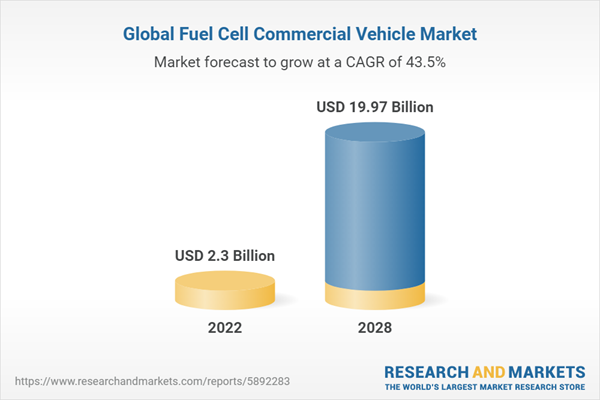Dublin, Feb. 14, 2024 (GLOBE NEWSWIRE) -- The "Global Fuel Cell Commercial Vehicle Market - Global Industry Size, Share, Trends, Opportunity, and Forecast, 2018-2028" report has been added to ResearchAndMarkets.com's offering.
The Global Fuel Cell Commercial Vehicle Market achieved a valuation of USD 2.3 Billion in 2022 and is projected to experience substantial growth throughout the forecast period, with a Compound Annual Growth Rate (CAGR) of 43.5% up to 2028.

This market marks a significant evolution in transportation, driven by the necessity to address environmental concerns and establish sustainable mobility solutions. Encompassing a diverse range of commercial vehicles, from trucks to buses, the Global Fuel Cell Commercial Vehicle Market is propelled by fuel cells that convert hydrogen into electricity, presenting an emission-free alternative to conventional internal combustion engines.
Fuel cell commercial vehicles possess key strengths, including zero emissions, extended driving ranges, and rapid refueling times, thereby overcoming challenges often linked to battery electric vehicles. As governments, industries, and consumers increasingly prioritize decarbonization and improvements in air quality, fuel cell vehicles emerge as a promising solution, particularly for applications demanding extended ranges and minimal downtime. The market's growth is bolstered by the expansion of hydrogen infrastructure, as governments and industry stakeholders collaborate to enhance refueling networks. Collaborations among automakers, energy companies, and technology providers expedite the deployment of fuel cell commercial vehicles, addressing issues concerning cost, technology, and infrastructure. However, challenges related to hydrogen production methods, infrastructure deployment, and vehicle costs remain to be tackled for broader adoption. Regions such as Europe, North America, and Asia Pacific, where significant efforts are directed towards hydrogen development and adoption, witness a rising traction for fuel cell commercial vehicles. As the transportation sector undergoes a transformative shift towards cleaner alternatives, the fuel cell commercial vehicle market is poised to reshape logistics, public transport, and various specialized domains, ushering in a new era of sustainable mobility that aligns with global decarbonization targets.
Key Market Drivers
1. Zero Emissions: The most significant advantage of fuel cell commercial vehicles is their emission-free profile. This feature makes them an appealing choice for businesses and governments striving to mitigate air pollution and adhere to stringent environmental regulations.
2. Longer Range and Faster Refueling: Fuel cell vehicles offer greater driving ranges compared to battery electric vehicles, rendering them suitable for applications necessitating extended operation, such as long-haul transportation and delivery services. Additionally, refueling a fuel cell vehicle with hydrogen takes a matter of minutes, significantly shorter than recharging a battery electric vehicle.
3. Reduced Dependence on Battery Charging Infrastructure: Fuel cell vehicles address concerns related to establishing a widespread electric charging infrastructure. Hydrogen refueling stations are emerging, enabling fuel cell vehicles to cover longer distances without the need for a dense network of charging points.
Key Market Challenges
1. Hydrogen Production: The sustainable and cost-effective production of hydrogen presents a challenge, involving various methods like electrolysis, natural gas reforming, and biomass gasification. The focus is on producing hydrogen in ways that align with decarbonization objectives.
2. Infrastructure Rollout: Establishing a network of hydrogen refueling stations demands significant investment and effort. Overcoming this challenge is pivotal for the broad adoption of fuel cell commercial vehicles.
3. Vehicle Cost: Presently, the cost of fuel cell vehicles is higher in comparison to conventional diesel or gasoline vehicles. Achieving cost parity through technological advancements and economies of scale remains a challenge.
Key Market Trends
1. Hydrogen Infrastructure Development: The success of fuel cell commercial vehicles hinges on the availability of hydrogen refueling stations. Governments and industry stakeholders are investing in hydrogen infrastructure to support the growth of these vehicles.
2. Partnerships and Collaborations: Automotive manufacturers, energy companies, and technology providers are forming partnerships to expedite the deployment of fuel cell commercial vehicles. Collaborations help overcome challenges related to infrastructure, technology development, and market penetration.
3. Scaling and Cost Reduction: Like any emerging technology, the initial costs of fuel cell vehicles are relatively high. However, ongoing research, development, and increased production volumes are expected to reduce costs over time, enhancing their competitiveness with conventional vehicles.
Key Market Players
- Toyota Motor Corp.
- Kenworth Trucks
- Nikola Motor Co.
- Zhejiang Geely Holding Group
- Scania
- BMW AG
- Volvo Group
Report Scope:
In this report, the Global Fuel Cell Commercial Vehicle Market has been segmented into the following categories, in addition to the industry trends which have also been detailed below:
Global Fuel Cell Commercial Vehicle Market, By Vehicle Type:
- Trucks
- Buses
Global Fuel Cell Commercial Vehicle Market, By Power Range:
- Below 100 kW
- 100 kW - 200 kW
- Above 200 kW
For more information about this report visit https://www.researchandmarkets.com/r/bhqeiw
About ResearchAndMarkets.com
ResearchAndMarkets.com is the world's leading source for international market research reports and market data. We provide you with the latest data on international and regional markets, key industries, the top companies, new products and the latest trends.
Attachment
